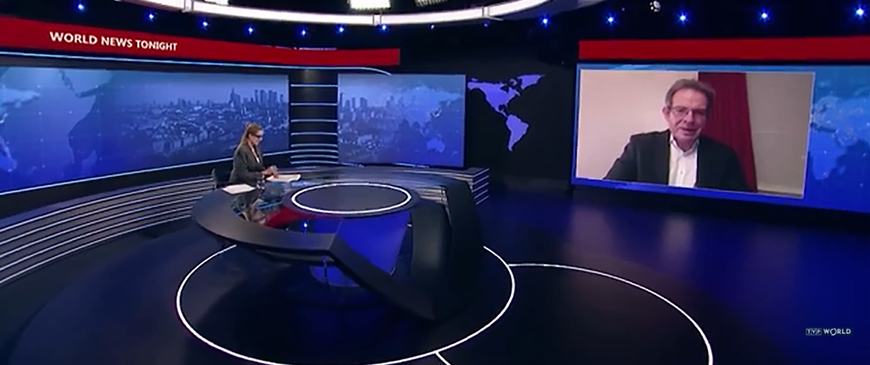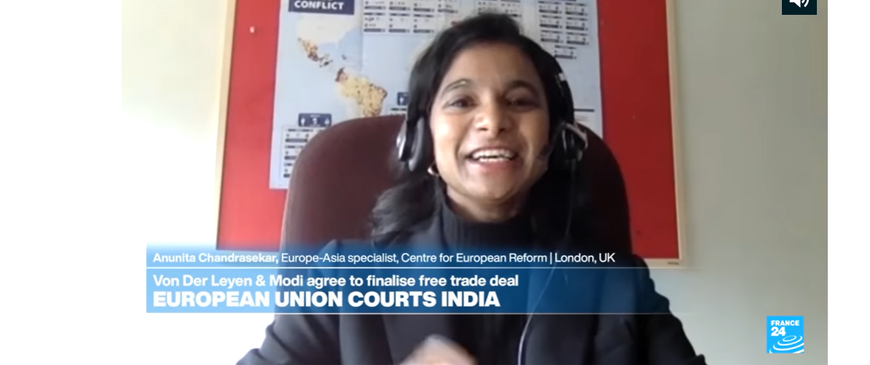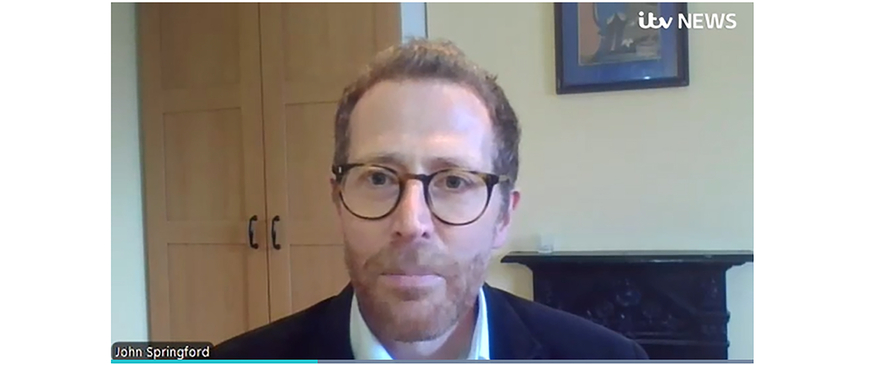Press
EU sees dreams of power wane as 'G-2' rises
27 January 2010
The Wall Street Journal
"The EU's attempts to be a coherent international actor seem to be decreasingly effective," says Charles Grant, director of the Centre for European Reform, a pro-EU London think-tank. ...China and Russia see the world in totally realist, zero-sum terms," says Mr Grant, adding: "If we want China to take us seriously we have to have hard power," or the ability to twist arms through economic, military or other means.
Europe and an inscrutable China
21 January 2010
The Economist
Charles Grant of the Centre for European Reform, a London based think-tank, says he and others who felt China was about to embrace multilateralism were guilty of "wishful thinking".
Haiti quake response exposes EU frailties
20 January 2010
EU Business
"Haiti is a terrible tragedy. Nobody cares about inter-institutional infighting in the outside world, they just want to see what Europe's going to do," said Hugo Brady, analyst at the Centre for European Reform think-tank. ...Brady said: "There is really going to be a big institutional mess while people rumble around for two years. It's a bit of a land grab at the beginning."
The Greek tragedy deserves a global audience
19 January 2010
Financial Times
Simon Tilford of the Centre for European Reform in London argued on these pages that it must be bailed out, instead. There are two other possibilities: Greece toughs it out; or Greece just defaults.
Bulgarian drops candidacy for European Commission
19 January 2010
International Herald Tribune
Charles Grant, director of the Centre for European Reform in London, said that Ms Jeleva's departure proves that the Parliament "has a real role to play for weeding out unacceptable commissioners." He added that Mr Barroso could not be blamed for accepting her candidacy, despite warnings that she faced a difficult confirmation hearing. "He doesn't have an intelligence service at his disposal," he said. "He has to accept what national capitals tell him. But it is very embarrassing for Bulgaria and for its prime minister."
A Greek crisis may well become Germany's problem
18 January 2010
The Times
"I just think they can't do it, and their growth prospects are worse than the Government is predicting," Simon Tilford, chief economist at the Centre for European Reform think-tank, said. "They need to make cuts, but the country has shown little or no ability to do it" — either to cut the pension costs and early retirement extracted by the unions, to cut waste in hospitals and defence or to curb rampant tax evasion in the private sector. Even if Greece made the cuts, that would push it into a slump and deflation; crippling for such a highly indebted country.
Greece faces EU grilling
17 January 2010
EU Business
Some analysts are meanwhile questioning whether leaving Greece to default - another prospect aired in past weeks - would be all that beneficial. "Greece is just the starkest example of the problems facing economies that have lost competitiveness within the eurozone and now have weak public finances and poor growth prospects," Simon Tilford, chief economist at the Centre for European Reform, wrote in the Financial Times on Friday. "Greece's problems cannot be solved by it alone," he argued.
Ukraine the loser as Viktors battle for Tymoshenko alliance
16 January 2010
Irish Times
"Ukraine has gone from being a darling of the EU to a complete and utter nightmare," says Tomas Valasek at the Centre for European Reform think-tank. "A few years ago most EU states were convinced it should be in the European Union within a few years. All that has changed."
UK anxiety over influence in Europe after crisis
15 January 2010
BBC News
"The crisis has made people question whether there is something wrong with the Anglo-Saxon model," said Charles Grant, director of the Centre for European Reform. His pro-European think-tank was the co-organiser of a conference in central London on Thursday to discuss the UK's role in the EU as the financial crisis recedes from memory.
Barnier wasn't dull but wasn't dangerous
15 January 2010
The Wall Street Journal
European officials say they are conscious of the potential to do damage by loading one regulation atop another. But in a new paper, Philip Whyte of the Centre for European Reform, a London-based think-tank, says "little attention is being paid to the overall impact of all the proposed changes".
Chaotic Greek economy spells trouble for eurozone
15 January 2010
Radio Free Europe
Simon Tilford, chief economist at the Centre for European Reform in London, says that the case in particular of Greece poses a significant challenge to the eurozone. "On the one hand, they can't let Greece get away with pursuing unsustainable policies; on the other hand, at the same time they can't be too tough with the Greek government, because there is only so much the Greek government can do, there is already risk of social instability in Greece," Tilford says.
Europe cannot afford to let Greece default
15 January 2010
Financial Times
The eurozone cannot afford to make an example of crisis-hit Greece. Claims by officials and politicians in the currency bloc's fiscally more robust economies - including Wolfgang Schauble, Germany's finance minister - that the Greeks will have to find their own way out of the crisis, are not credible.
Spain signals ambitious EU presidency, at the risk of friction
14 January 2010
The Telegraph
"The presidency is an important domestic issue for the (Spanish) government," said Hugo Brady, an analyst for the London-based Centre for European Reform. ..."I respect Spain for their audacity, they're saying the current system of the Lisbon strategy is not working and they're right," said Brady. "But the reality of politics is that certain large (EU) member-states will never accept a binding system or sanctions regarding economic policy.
Despair in West over situation in Ukraine
12 January 2010
Reuters
"Ukraine has gone from being a darling of the EU to a complete and utter nightmare," said Tomas Valasek at the Centre for European Reform think-tank. "A few years ago most EU states were convinced it should be in the European Union within a few years. All that has changed." ...Valasek said the election could be a last chance for Ukraine to revive its EU prospects. "With the economy being in such terrible shape, the appetite and desire among EU member-states to consider Ukraine as a potential member has decreased correspondingly," he said.
New treaty for EU, but same jostling for power
08 January 2010
The New York Times
Tomas Valasek, director of foreign policy and defence at the Centre for European Reform, said: "Spain wants to hold on to as many of the trappings of the old rotating presidency as it can. No-one wants to lose cachet." ...The consequence, Mr. Valasek said, is that "it leaves Van Rompuy in a situation where the Spanish would rather that he didn't exist."
Carbon tariffs resurface in Copenhagen aftermath
08 January 2010
EurActiv.com
Experts expect carbon border tariffs to make a comeback in the post-Copenhagen debate as carbon-intensive industries seek to protect domestic production from international competitors. "I think there is a very real risk following Copenhagen that governments, particularly within the EU, will argue more strongly for border tax adjustments," said Simon Tilford, chief economist at the Centre for European Reform (CER), a think-tank.
EU Commission nominees face scrutiny by parliament
08 January 2010
Reuters
Among the Commission candidates who can expect intense questioning are those from Romania and Bulgaria - the two newest EU member states - with doubts about their abilities for the agriculture and international aid posts respectively. "They are the danger candidates," said Hugo Brady, a political analyst at the Centre for European Reform think-tank, explaining that the parliament was keen to exercise the extra authority it had gained with the passage of the Lisbon treaty. "Parliament will gladly take a scalp," he said.
Serbia EU membership bid faces range of hurdles
08 January 2010
Voice of America
Tomas Valasek, with London's Centre for European Reform, says Serbia's membership bid comes at a difficult time. "The Serbian situation has not been helped by the reality and the fact that lots of EU member states have really got cold feet on further enlargement. Quite a few, especially the older member states, feel that the EU has already enlarged too far, too fast and that we now need a period of rest and a pause, rather than rushing into another enlargement. Having said that, the EU is committed to enlarging eventually to the western Balkans.
The next big thing in EU defence? Spare parts, faster
07 January 2010
Defence News
But Clara O’Donnell, a researcher at the Centre for European Reform think-tank, cautions that it may take quite some time before EU members trust one another enough to ful¬fill the potential of the directive. "Some member-states, in particular the eastern European members, have less of a track record in enforcing effective export controls," O'Donnell said. ...O'Donnell said the next five or so years might bring more European competition in nonsensitive areas such as military boots, rifles and uniforms.
Charismatic outsider
07 January 2010
European Voice
"Westerwelle does not have a lot of experience with foreign policy and his public statements on international issues so far do not add up to a coherent Weltanschauung [worldview]," says Katinka Barysch, an expert on Germany at the Centre for European Reform, a London-based think-tank. She says that the finance ministry would have been a more natural choice for Westerwelle, who has campaigned on tax reform and liberalising Germany's labour market.


















